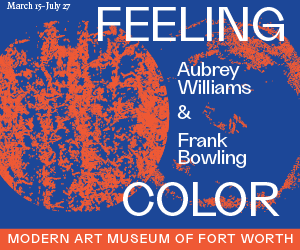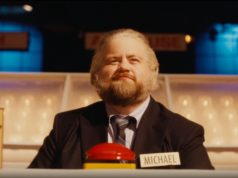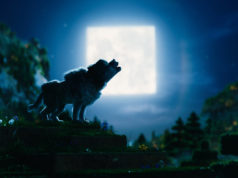Buck is a close study about a horseman and his methods, so no wonder it has widened out beyond the specialty art-house theaters here in North Texas, where there’s a natural constituency of moviegoers who are interested in horses. On the other hand, I am a city boy who’s had minimal exposure to horses over the course of my life, and yet I still found this documentary absorbing.
 Dan Brannaman was nicknamed “Buckshot” as a kid and over the years became known simply as “Buck.” As boys, he and his brother were pushed into the performing spotlight as trick ropers by their father, who beat them severely when they failed to perform up to his standards or just when he was drunk and raving. Eventually Buck started conducting seminars on how to control unruly horses. At a time when people often spoke of “breaking” horses and used cruelty to bring the animals to heel, Buck became famous for getting results by treating horses gently. This brought him to the attention of novelist Nick Evans, who used him as the inspiration for his book The Horse Whisperer, and then later to Robert Redford when he was directing the film version of the novel.
Dan Brannaman was nicknamed “Buckshot” as a kid and over the years became known simply as “Buck.” As boys, he and his brother were pushed into the performing spotlight as trick ropers by their father, who beat them severely when they failed to perform up to his standards or just when he was drunk and raving. Eventually Buck started conducting seminars on how to control unruly horses. At a time when people often spoke of “breaking” horses and used cruelty to bring the animals to heel, Buck became famous for getting results by treating horses gently. This brought him to the attention of novelist Nick Evans, who used him as the inspiration for his book The Horse Whisperer, and then later to Robert Redford when he was directing the film version of the novel.
First-time filmmaker Cindy Meehl lays out this story in an easy, unfussy manner that eschews melodrama and teary confessions. A few points could have been clarified to sharpen the movie’s portrait, but these are relatively minor omissions. She’s helped by having such an engaging subject, a soft-spoken gentleman whose laconic nature hides a delightfully deadpan sense of humor honed by years of public speaking. The interviews with Buck’s family and friends are illuminating and entertaining — his elderly foster mother shows much the same sense of humor — as are his interactions with the wife and teenage daughter from whom he’s separated for much of the year. By the way, his daughter is named Reata. Buck is a horseman through and through.
The movie’s climax shows Buck taking on an orphaned, developmentally challenged stud horse at a clinic in Montana. The stallion in question has a beautiful golden coat and an extraordinarily vicious temper, a result of never having been socialized either by other horses or by his human trainer, who was severely injured shortly after the horse’s birth. Buck’s methods fail, and it seems odd that the film would be structured around that. However, the failure is instructive, and not just because it humanizes Buck by showing his fallibility. Unlike some misguided animal-lovers, he never romanticizes the horses or ascribes human desires or emotions to their actions, nor does he forget that these strong, powerful creatures are capable of killing someone. In his final assessment, he recognizes that the stallion is a lost cause but also sees all the factors that could have saved the horse. Clearly his own childhood colors his approach to both horses and people. What sort of strength of character does it take for him to be so kind to everyone after such a violent childhood? I don’t know, but seeing that quality in action is what makes Buck so inspiring.
Buck
Starring Buck Brannaman. Directed by Cindy Meehl. Rated PG.











